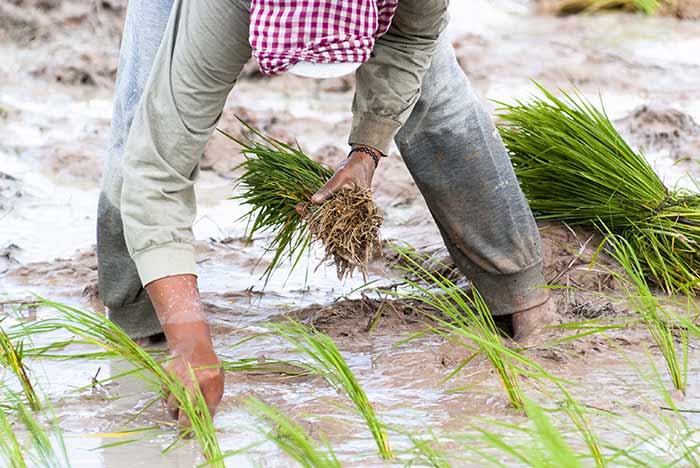OECD analysis found that government aid to the sector, in the form of subsidies or protective taxes on imports, was worth around 3.3% of GDP – almost five times the OECD average of 0.7%. However agricultural performance and productivity lags well behind that of other countries.
Agriculture is one of the Philippine economy’s key sectors – accounting for one-third of employment and one-tenth of GDP, and providing a livelihood for one in three people – but the OECD said support for it had been misdirected, served to distort the market or triggered uncertainties.
Two of the key aims of the government’s agricultural policy have been to alleviate poverty by ensuring a stable and affordable supply of food and to promote self-sufficiency, particularly in rice production.
Policies to achieve this have included the government purchasing rice from producers at a good price, controlling imports and subsidising supplies, equipment and infrastructure such as irrigation systems.
However, the OECD noted that price support for rice, which increases the cost for consumers, resulted in a 3.2 million rise in the number of undernourished people.
Such policies have also prevented a shift towards more high value commodities, seen in other countries in the region, which would boost rural incomes and improve food security.
As other nations have moved towards a bigger variety of crops offering higher returns while occupying less land , they have outdone the Philippines in terms of productivity.
In 1990, for instance, the Philippines ranked second in the region, below Malaysia in terms of productivity per farm worker. In 2012, it was overtaken by Thailand and China, and Malaysia’s productivity was 6.2 times higher.
Meanwhile, restrictions on land-market transactions and insecure property rights have limited investment and credit opportunities for the sector.
The OECD said that as the country’s supply of land for agriculture comes under increasing threat from natural disasters, climate change, population growth and urbanisation, the Philippines needs to improve policy coordination and ensure a more consistent focus on its priorities.
For instance, it said the government’s main food body, the National Food Authority, could focus on building emergency supplies rather than distribution of land or food and price control.
The think-tank also called for less bureaucratic complexity in the country’s agricultural institutions, greater coordination between local and national governments, and more incentives for local authorities to spend on trained and qualified staff.
“A reformed policy environment... would help ensure the sector contributes to improved food security and poverty reduction,” said OECD director of trade and agriculture Ken Ash.
“Restructuring government support away from self-sufficiency targets, in particular for rice production, towards measures that strengthen productivity and overall farm profitability on a sustainable basis will be critical.”














